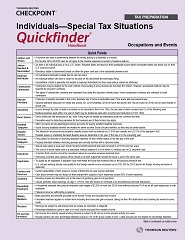We're available Monday to Friday from 8 a.m. to 6 p.m. eastern time.
Need help right now? Call 1-800-431-9025.

The 2025 Individuals - Special Tax Situations Quickfinder Handbook will be available in December 2025. Pre-order your Handbook today.

In addition to the general tax rules that apply to all individuals, some individuals are subject to special tax rules that apply to them because of their occupation, investments, or life events. As a tax preparer, you’ll likely encounter these types of clients so it’s important to have a tax resource specifically designed to answer the questions you’ll face when preparing their returns.
The Individuals - Special Tax Situations Quickfinder Handbook will save you time and money on those out of the ordinary tax returns or tax situations you’ll encounter when preparing individual returns. It covers more than 30 types of unique taxpayers.
The Handbook includes:
By honing in on the specific tax rules that apply to specific taxpayers, the Individuals - Special Tax Situations Quickfinder Handbook is the perfect complement to the 1040 Quickfinder Handbook.
See information above for new edition availability. To order the current or prior tax year editions, please call us at 800-431-9025.